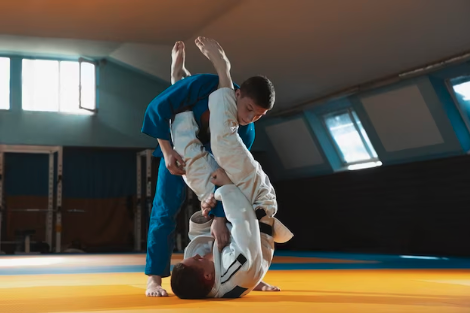Beginner’s Guide: What is Brazilian Jiu-Jitsu?

Brazilian Jiu-Jitsu (BJJ) is a martial art that originated in Brazil in the early 20th century and has become increasingly popular around the world over the past few decades. BJJ is a form of grappling where the goal is to take your opponent to the ground and use technique and leverage to control them or submit them with chokes or joint locks.
BJJ is widely considered to be one of the most effective martial arts for self-defence and a popular sport with its own competitions and tournaments. In this blog, we will explore its history, how it differs from other forms of martial arts, the benefits of training in BJJ, and why it has become one of the fastest-growing martial arts in the world.
The History of BJJ Jiu-Jitsu
BJJ is rooted in the Japanese martial art of Judo, which emphasizes throws and grappling techniques. In the early 20th century, a man named Mitsuyo Maeda moved to Brazil and began teaching Judo to the locals. One of the people he taught was Carlos Gracie, who began to develop his own style of Judo based on his smaller stature. Carlos and his brothers continued refining this new style, which eventually became Brazilian Jiu-Jitsu.
The Gracie family began to promote BJJ in Brazil through exhibitions, competitions and fights with practitioners of other martial arts. In 1993, the Gracie family gained widespread recognition when Royce Gracie won the first-ever Ultimate Fighting Championship (UFC) in the United States, defeating much larger opponents with his BJJ technique. This brought international attention to BJJ, which has continued to grow in popularity ever since.
Today, BJJ is practised and competed globally, with countless schools and academies dedicated to teaching this dynamic and effective martial art.
How does it work?
BJJ is primarily a ground-fighting martial art that involves grappling, submissions, and ground control techniques.
One of the key differences between BJJ and other martial arts is its emphasis on utilising leverage and technique to control and submit larger opponents instead of relying solely on strength and striking techniques. BJJ practitioners learn how to take their opponents down to the ground and then use joint locks, chokes, and other submission techniques to force them to submit.
Unlike many other martial arts, BJJ is not about knocking out or injuring an opponent but rather about controlling the situation and subduing the opponent without causing harm. This makes it one of the best jiu-jitsu practises for self-defence and can be used in real-world situations.
The benefits of Brazilian Jiu-Jitsu
Brazilian Jiu-Jitsu offers numerous benefits for both the mind and body. Physically, training in BJJ can help individuals build strength, increase flexibility, and improve cardiovascular health. It also provides a full-body workout and can help individuals lose weight and build muscle.
Mentally, BJJ can help you to build confidence, improve focus, and reduce stress. Its technical and strategic nature also helps practitioners develop problem-solving skills and the ability to stay calm under pressure. Additionally, it is a social activity where you can make new friends and join a supportive community of like-minded individuals.
Finally, competing in BJJ tournaments can be a rewarding experience that gives individuals a chance to test their skills and push themselves to new heights!
The challenges of Brazilian Jiu-Jitsu
BJJ Jiu Jitsu can be a challenging martial art to learn and practice. Many techniques require precise timing, body positioning, and leverage, which can take years to master.
Due to the nature of BJJ as a ground-fighting martial art, training involves a lot of physical contact, which can be intimidating or uncomfortable for some people. Furthermore, BJJ training can be physically demanding and often involves repetitive drilling of techniques. It may take time to see progress in one’s ability or physical fitness.
Lastly, matches can be mentally and emotionally challenging since competing against someone with the goal of submitting or controlling can produce high pressure and stress. Nonetheless, many practitioners find these challenges worth it, as they eventually lead to tremendous personal growth and improved skills.
Overall, Brazilian Jiu-Jitsu is a great form of self-defence, and it is also a brilliant type of exercise that can help improve your strength, flexibility and stamina. At Safari Health Hub, we offer BJJ classes so you can try it out and feel the benefits for yourself.

